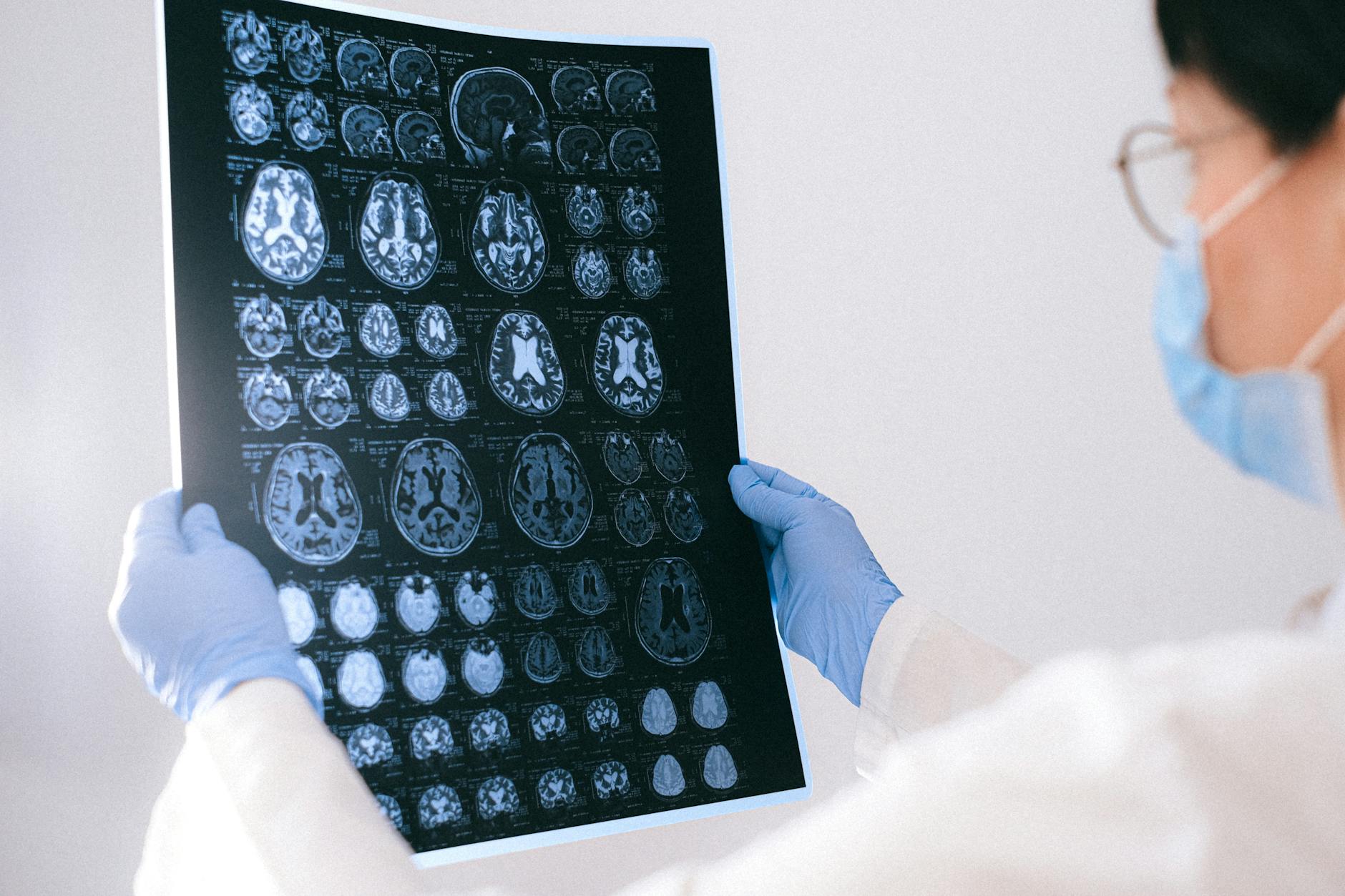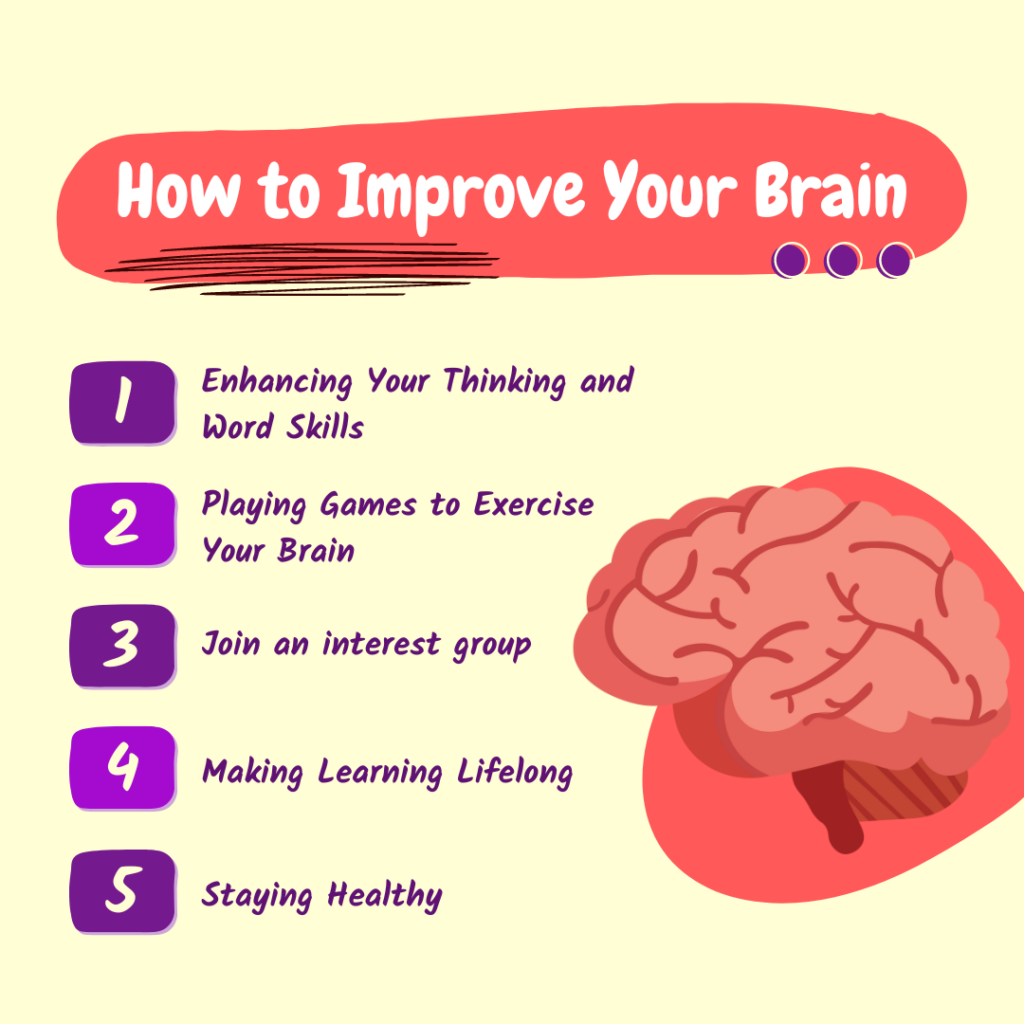Ever wished you could remember things more easily or stay focused even during the most hectic days? Improving your brain power, memory, and focus isn’t just about loading up on caffeine or trying the latest productivity hack. It’s about nurturing your brain’s health with simple, effective strategies that can make a real difference. From what you eat to how you think, small changes can lead to big improvements in your cognitive functions.
In our fast-paced lives, our ability to remember details and stay sharp is crucial, whether we’re at work, in school, or managing household responsibilities. Enhancing these skills can boost our performance across all areas of life, making us more efficient and reducing stress. Imagine being able to learn faster, recall information easily, and maintain laser focus on tasks. It’s not just a dream—it’s achievable with the right approach.
This post will guide you through practical tips and techniques to keep your brain in top shape. We’ll cover dietary choices, mental exercises, and lifestyle tweaks that promote cognitive health. By the end, you’ll have a clear roadmap to a sharper, more focused you. Let’s get started on the journey to unlocking your brain’s full potential!
Click Me to Check Out the Video Guide to Increase Your Brain Performance
Understanding Brain Power, Memory, and Focus
Enhancing your brain power, memory, and focus is key to unlocking your full potential. Understanding how the brain functions and the impact of brain health on overall well-being can give you the tools to improve these cognitive abilities.
The Science Behind Brain Function
 Photo by Anna Shvets
Photo by Anna Shvets
Our brains are fascinating and complex organs. They control everything from basic bodily functions to complex thoughts and emotions.
- Neurons: These are the building blocks of the brain. Each neuron connects with others to form networks. When you learn something new, neurons communicate by sending electrical signals via synapses.
- Synapses: These are the gaps between neurons where communication happens. When you learn or practice something, synapses strengthen, making the connections more efficient.
- Neuroplasticity: This is the brain’s ability to change and grow throughout your life. Neuroplasticity allows the brain to adapt by forming new neural pathways and modifying old ones. This means you can improve your brain’s function through practice and learning.
Click Me to Check Out the Video Guide to Increase Your Brain Performance
Understanding these basics helps us see why continuous learning and mental exercises are crucial. Just as physical exercise strengthens muscles, mental exercise strengthens neural connections.
Why Brain Health Matters
Good brain health is vital for your overall well-being and performance. A healthy brain makes you more efficient, focused, and emotionally balanced.
- Mental Well-being: A healthy brain can regulate emotions better, reducing the risk of mood disorders. Maintaining good brain health helps you handle stress effectively and enjoy a more positive outlook on life.
- Cognitive Function: This includes memory, problem-solving, and decision-making. Good brain health can enhance these abilities, making daily tasks easier and improving performance in work or school.
- Physical Health: The brain controls many bodily functions, so keeping it healthy can improve overall physical health. For example, regular physical exercise not only benefits the body but also boosts brain health by improving blood flow and reducing inflammation (source).
In summary, understanding how your brain works and why its health is crucial can motivate you to take steps to improve its function. By incorporating mental exercises, continuous learning, and healthy lifestyle choices, you can significantly enhance your brain power, memory, and focus.
Diet and Nutrition for Brain Health
When it comes to boosting brain power, memory, and focus, what you eat can make a big difference. The brain, like any other organ, needs the right fuel to function optimally. A diet rich in specific nutrients can support cognitive function and overall brain health. Let’s explore the best foods and supplements that can give your brain a natural boost.
Foods That Boost Brain Power
Photo by Ella Olsson
Certain foods are particularly beneficial for brain health. Here are some that you should consider adding to your diet:
- Walnuts: These nuts are excellent for brain health. They contain high levels of DHA, a type of Omega-3 fatty acid that’s crucial for brain function. Some studies even suggest that walnuts can help improve memory (source).
- Berries: Berries, especially blueberries, are packed with antioxidants that help reduce oxidative stress and inflammation, which can contribute to brain aging and neurodegenerative diseases. Berries like strawberries, blackberries, and raspberries are also beneficial.
- Fatty Fish: Fish like salmon, trout, and sardines are rich in Omega-3 fatty acids, which are essential for brain health. Omega-3s help build cell membranes in the brain and can improve cognitive function (source).
- Leafy Greens: Vegetables like spinach, kale, and broccoli contain nutrients like vitamin K, lutein, folate, and beta carotene, which are believed to slow cognitive decline.
- Pumpkin Seeds: These seeds are rich in magnesium, iron, zinc, and copper. Each of these nutrients is critical for brain health. For example, zinc is essential for nerve signaling, and magnesium is necessary for learning and memory (source).
Incorporating these foods into your daily diet can provide the nutrients your brain needs to stay healthy and function optimally.
Supplements for Cognitive Function
Photo by PhotoMIX Company
In addition to a healthy diet, certain supplements can support brain health. Here are some of the most researched and recommended options:
- Omega-3 Fatty Acids: Often found in fish oil supplements, Omega-3 fatty acids are crucial for cognitive function. They help maintain the health of cell membranes and facilitate communication between brain cells. Studies have shown that they can improve memory and attention (source).
- Ginkgo Biloba: This ancient herb is known for its potential to improve blood flow to the brain. Some research suggests that Ginkgo Biloba can help enhance memory, attention, and other cognitive functions. It’s available in various forms, including capsules and extracts (source).
- Bacopa Monnieri: This herb has been used in Ayurvedic medicine for centuries. It’s believed to boost brain function by enhancing memory and reducing anxiety. Studies have shown that it can improve cognitive performance and speed of information processing (source).
- Ginseng: Often found in energy drinks and supplements, Ginseng is known for its potential to boost brain function. It can help improve cognitive performance, particularly in tasks that require thinking and memory.
While supplements can be beneficial, it’s essential to consult with a healthcare provider before starting any new supplement regimen, especially if you’re taking other medications.
In summary, eating the right foods and considering beneficial supplements can go a long way in improving brain health. With the right nutrients, you can enhance your brain’s performance, memory, and focus naturally and effectively.
Physical Exercise and Brain Function
Physical exercise is not only beneficial for your body but also for your brain. Engaging in regular physical activity can significantly enhance cognitive abilities, improve memory, and increase focus.
How Exercise Enhances Cognitive Abilities
 Photo by Monstera Production
Photo by Monstera Production
Exercise has a profound impact on cognitive abilities. Here’s how different types of exercises can help:
- Cardiovascular Exercise:
- Improves Blood Flow: Cardio workouts like running, swimming, and cycling increase your heart rate, pumping more blood to your brain. This improved circulation delivers more oxygen and nutrients, enhancing brain function.
- Promotes Neurogenesis: Regular cardiovascular exercise promotes the growth of new brain cells, a process known as neurogenesis. This is particularly beneficial in areas related to memory and learning.
- Reduces Stress: Cardio exercises can reduce stress hormones and trigger the release of endorphins, the body’s natural mood lifters, which can improve mental clarity.
- Strength Training:
- Enhances Memory: Strength training, such as lifting weights or bodyweight exercises, has been shown to improve episodic memory (memory of events).
- Increases Growth Factors: This form of exercise increases the production of growth factors that aid in brain cell survival and the growth of new blood vessels in the brain.
- Boosts Mood: Just like cardio, strength training can boost endorphins, helping to reduce anxiety and improve overall mood.
Click Me to Check Out the Video Guide to Increase Your Brain Performance
According to a Harvard Health article, both aerobic exercises and resistance training can significantly boost brain health.
Best Exercises for Brain Health
Certain exercises are particularly effective in promoting brain health. Here are some of the best options:
- Aerobic Workouts:
- Running: It’s great for cardiovascular health and can create a clearer, more focused mind.
- Swimming: A comprehensive workout that boosts blood flow to the brain while also being gentle on the joints.
- Cycling: Enhances both lower body strength and cardiovascular health, leading to improved brain function.
- Yoga:
- Mind-Body Connection: Yoga combines physical postures with mindful breathing and meditation, which can enhance overall mental well-being.
- Stress Reduction: Practices like Hatha and Vinyasa yoga can reduce stress-related hormone levels, helping to calm the mind. According to Calyx Senior Living, yoga is excellent for boosting memory and focus.
- Tai Chi:
- Balance and Coordination: This slow, gentle exercise improves balance, coordination, and cognitive clarity.
- Mental Focus: The meditative aspect of Tai Chi helps in enhancing mental focus and reducing stress.
- Relaxation: It’s particularly effective for relaxation and improving mental clarity by focusing on synchronized movements and breathing.
Regularly incorporating these exercises into your routine can help enhance your brain’s performance, improve memory, and sharpen your focus. From boosting blood flow to encouraging the growth of new brain cells, physical activity is a powerful tool for cognitive health.
Consider integrating activities like running, yoga, and Tai Chi into your routine for the best results.
Mental Exercises to Improve Memory and Focus
Improving your memory and focus isn’t just about what you eat or your daily routines. Engaging your mind with specific mental exercises can significantly enhance these cognitive skills. Let’s look at some effective ways to give your brain the workout it needs.
Brain Training Activities
 Photo by Konstantin Mishchenko
Photo by Konstantin Mishchenko
There are plenty of activities designed to train your brain and enhance memory and focus. These exercises can be as fun as they are effective:
- Puzzles: Whether it’s crosswords, Sudoku, or jigsaw puzzles, these challenges can help improve problem-solving skills and memory. Each time you solve a puzzle, you’re forcing your brain to think in new ways, creating and strengthening neural pathways.
- Brain Games: Games like chess, checkers, or even video games that require strategic thinking can enhance cognitive abilities. These games force you to plan ahead, manage resources, and think critically.
- Memory Challenges: Engage in activities that test your memory. This could include card games like Concentration or even trying to remember a list of items and then recalling them later. These challenges help improve working memory, which is crucial for focus and learning.
- Learning New Skills: Taking up a new hobby or learning a new language can be incredibly beneficial. The process of learning something new requires intense concentration and can enhance both memory and focus.
By regularly participating in these activities, you can keep your brain sharp and improve your cognitive skills.
Click Me for Free Video Guide How to Increase Brain Performance
The Role of Meditation and Mindfulness
Meditation and mindfulness practice are powerful tools for enhancing focus and memory. Here’s how they can help:
- Improved Focus and Concentration: Meditation trains your mind to stay focused on a single point of reference, such as your breath. Over time, this practice can significantly enhance your concentration levels (source).
- Reduced Stress: Stress is a significant barrier to effective concentration and memory. Meditation helps reduce stress by calming the mind and body, making it easier to focus on tasks at hand (source).
- Enhanced Memory: Mindfulness meditation can improve your working memory by helping you process and retain new information more effectively. Studies have shown that meditation practices can increase the density of gray matter in brain areas related to memory (source).
To get started with meditation, find a quiet space, sit comfortably, and focus on your breath. Begin with just a few minutes each day and gradually increase the duration as you become more comfortable with the practice.
Incorporating mental exercises and mindfulness practices into your daily routine can significantly enhance your cognitive abilities. Remember, just like with physical exercise, consistency is key. With regular practice, you’ll likely notice improvements in your memory and focus, making everyday tasks easier and more manageable.
Sleep and Brain Health
Good sleep is essential for our overall health, especially for our brain. It’s when we sleep that our brain processes information, consolidates memories, and rejuvenates for the next day.
The Importance of Quality Sleep
 Photo by Pixabay
Photo by Pixabay
Sleep is not just about resting our body; it’s also crucial for our brain. We go through different stages of sleep, and each stage has a unique impact on our cognitive functions.
- NREM Sleep: Non-REM sleep consists of stages 1, 2, and 3. NREM is essential for physical restoration and memory consolidation. Stages 1 and 2 are light sleep stages where your body begins to relax. Stage 3, also known as deep sleep, is where the brain and body undergo the most significant rejuvenation.
- REM Sleep: Rapid Eye Movement (REM) sleep is when most dreaming occurs. This stage plays a vital role in cognitive functions such as decision-making, creativity, and emotional regulation. REM sleep cycles are critical for memory consolidation and processing complex information.
Each sleep stage contributes to brain health, and skipping any can impair cognitive abilities. Quality sleep ensures that your brain functions at its best, enabling better memory retention, sharper focus, and effective learning.
Tips for Better Sleep Hygiene
To enjoy quality sleep and its brain-boosting benefits, adopting good sleep hygiene practices is essential. Here are some actionable tips to help improve your sleep quality:
- Maintain a Consistent Sleep Schedule: Try to go to bed and wake up at the same time every day, even on weekends. Consistency reinforces your body’s sleep-wake cycle and helps improve sleep quality (source).
- Create a Sleep-Friendly Environment:
- Keep Your Room Cool: A cooler room (about 65°F to 68°F) aids sleep.
- Block Out Light: Use blackout curtains or an eye mask to keep the room dark.
- Minimize Noise: Use earplugs or a white noise machine to block out disruptive sounds (source).
- Establish a Bedtime Routine: Develop a relaxing pre-sleep routine to signal your body that it’s time to wind down. This could include activities like reading, taking a warm bath, or practicing relaxation exercises.
- Limit Caffeine and Alcohol: Avoid consuming caffeine or alcohol in the late afternoon and evening. Both substances can interfere with your ability to fall asleep and stay asleep (source).
- Be Mindful of Food and Drink: Try not to go to bed either hungry or overly full. Avoid heavy or large meals within a couple of hours of bedtime.
- Include Physical Activity in Your Day: Regular physical activity can help you fall asleep faster and enjoy deeper sleep. However, try to avoid vigorous exercise close to bedtime.
By following these tips, you can create a conducive environment for sleep and establish routines that promote better sleep hygiene. Quality sleep is the foundation for a healthy brain, helping you stay sharp, focused, and emotionally balanced.
Click Me for Free Video Guide How to Increase Brain Performance
Lifestyle Changes to Enhance Brain Health
Enhancing brain health isn’t just about mental exercises and proper nutrition—your lifestyle plays a significant role too. Below are important lifestyle changes that can improve your brain health and cognitive functions.
Stress Management Techniques
Photo by Mikhail Nilov
Stress can take a serious toll on your brain health, increasing the risk of cognitive problems and even Alzheimer’s disease. Here are some effective stress management techniques:
- Deep Breathing: Deep breathing exercises can calm your mind and body, reducing the impact of stress on your brain. Techniques like diaphragmatic breathing involve deep, slow breaths that can help lower anxiety levels and improve focus.
- Engaging in Hobbies: Hobbies such as gardening, painting, or reading can be therapeutic. They provide a mental break and allow you to reset, which can improve your brain’s response to stress. Essentially, when you’re engrossed in something you love, it acts as a shield against stress.
- Social Interactions: Connecting with friends and family can significantly reduce stress. Social interactions release oxytocin, often referred to as the “love hormone,” which can counteract stress hormones like cortisol.
- Physical Activity: Exercise is a powerful stress buster. It not only reduces the body’s stress hormones but also stimulates the production of endorphins, chemicals in the brain that act as natural painkillers and mood elevators. Regular physical activity ensures both your body and brain stay healthy.
- Mindfulness and Meditation: Incorporating mindfulness practices can greatly reduce stress. Techniques like meditation or even mindful walking can help you stay in the moment and reduce anxiety.
To explore more about managing stress for better brain health, check out Harvard Health and Nuvance Health.
Staying Socially Active
Being socially active isn’t just about having fun—it’s crucial for brain health. Here’s how maintaining social connections can benefit your brain:
- Cognitive Stimulation: Social activities stimulate cognitive processes such as memory, attention, and problem-solving. For instance, a lively conversation can challenge your brain, keeping it flexible and resilient (source).
- Emotional Support: Social connections provide emotional support, which is comforting and can create a sense of belonging. This emotional security can reduce stress and anxiety, which are harmful to brain health.
- Enhanced Longevity: Research suggests that people who are more socially connected live longer. Social engagement can even help delay the onset of cognitive decline and dementia (source).
- Increased Physical Activity: Social activities often include physical movement, whether it’s dancing, walking, or playing sports. Physical exercise combined with social interaction can have a compounding positive effect on your brain.
- Mood Enhancement: Interacting with others can improve mood by reducing feelings of loneliness and depression. A healthier mood contributes to better cognitive function and overall brain health.
For more details on the benefits of staying socially active for your brain health, refer to Harvard Health and Forbes.
By making these lifestyle changes—managing stress effectively and staying socially active—you can greatly enhance your brain health. These adjustments can help keep your mind sharp, focused, and resilient.
Conclusion
Improving your brain power, memory, and focus is achievable with dedication and the right strategies. From eating brain-boosting foods and taking beneficial supplements to engaging in physical and mental exercises, each step contributes to better cognitive health.
Don’t forget the power of quality sleep and stress management. These, along with lifestyle adjustments like staying socially active and practicing mindfulness, can make a significant difference.
Start implementing these strategies today to give your brain the boost it needs. A sharper, more focused mind awaits!






Thank you for this fantastic post! The information you provided is very useful and well-explained. I especially liked how you broke down complex concepts into easily understandable parts. Your writing is clear and concise, making it a pleasure to read. Looking forward to more of your posts.
💕Thank You Kylee Fisher Awesome feedback. I am so excite to write more… Will share you more
Looking forward to waiting for your valuable feedback in future.
❤️ Thank You once Again.